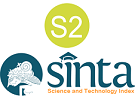Upaya Membangun Keterampilan Proses Sains Melalui Pembelajaran Inkuiri Berbantuan Alat Peraga Gaya Sentripetal
Abstract
Pemahaman konsep tentang fisika akan lebih mudah diterima oleh siswa apabila mereka memiliki keterampilan proses sains. Pembelajaran inkuiri adalah salah satu alternatif untuk membangun keterampilan proses sains ini. Materi fisika gaya sentripetal dianggap oleh siswaidentik dengan persamaan matematis, maka peneliti mengupayakan penggunaan alat peraga gaya sentripetal untuk menunjang pembelajaran inkuiri. Tujuan penelitian ini adalah untuk membangun ketrampilan proses sains siswa melalui pembelajaran inkuiri berbantuan alat peraga gaya sentripetal sehingga hasil belajar dapat meningkat. Rancangan penelitian menggunakan penelitian tindakan kelas yang terdiri dari 2 siklus. Masing-masing siklus terdiri dari langkah: perencanaan, implementasi, evaluasi dan refleksi yang mengadopsi model spiral dari Kemmis dan MC Taggart. Hasil penelitian ini adalah sebagai berikut 1) terjadi peningkatkan ketrampilan proses sains pada siswa kelas X SMA melalui pembelajaran inkuiri menggunakan alat peraga dengan persentase ketercapaian keterampilan proses sains setelah CAR 89,34 % 2) Terjadi peningkatan hasil belajar siswa kelas X SMA melalui pembelajaran inkuiri menggunakan alat peraga ditunjukan oleh nilai rata-rata tes essai setelah CAR sebesar 85,2.
Keywords
Full Text:
PDFReferences
Adnyana, P. B. and Citrawathi, D. M. (2017) ‘The Effectiveness of Question-Based Inquiry Module in Learning Biological Knowledge and Science Process Skills’, International Journal of Environmental & Science Education, 12(8), pp. 1871–1878.
Alkan, F. (2016) ‘Experiential Learning : Its Effects on Achievement and Scientific Process Skills’, Journal of Turkish Science Education, 13(2), pp. 14–26. doi: 10.12973/tused.10164a.
Arikunto, S. (2002) ‘Metodologi penelitian’. Jakarta: PT. Rineka Cipta.
Brickman, P. et al. (2009) ‘Effects of inquiry-based learning on students’ science literacy skills and confidence’, International Journal for the Scholarship of Teaching and Learning, 3(2), pp. 1–22.
Dahar (2002) Teori-Teori Belajar. Jakarta: Erlangga.
Dwi, D. F. (2016) Efek Model Pembelajaran Inquiry Training Menggunakan Mind Mapping Dan Motivasi Terhadap Keterampilan Proses Sains Fisika. Unimed.
Ergül, R., Sevgül ÇALI, Y. and Özdlek, Z. (2011) ‘the Effects of Inquiry-Based Science Teaching on Elementary School Students’ Science Process Skills and Science Attitudes’, Bulgarian Journal of Science and Education Policy, 5(1), pp. 48–68.
Ernst, J. V. (2013) ‘Impact of experiential learning on cognitive outcome in technology and engineering teacher preparation’, Journal of Technology Education, 24(2), pp. 31–40. doi: 10.21061/jte.v24i2.a.3.
Ertikanto, C. and others (2017) ‘Development and Evaluation of a Model-Supported Scientific Inquiry Training Program for Elementary Teachers in Indonesia.’, International Journal of Instruction. ERIC, 10(3), pp. 93–108.
Gultepe, N. and Kilic, Z. (2015) ‘Effect of scientific argumentation on the development of scientific process skills in the context of teaching chemistry’, International Journal of Environmental and Science Education, 10(1), pp. 111–132. doi: 10.12973/ijese.2015.234a.
Hasbi, M. A. and others (2015) ‘Pengembangan Alat Peraga Listrik Dinamis (APLD) Berbasis Inkuiri untuk Meningkatkan Penguasaan Konsep Siswa’, Jurnal Penelitian Pendidikan IPA, 1(1).
Kemmis, S., McTaggart, R. and Nixon, R. (2013) The action research planner: Doing critical participatory action research. Springer Science & Business Media.
Koksal, E. A. and Berberoglu, G. (2014) ‘The Effect of Guided-Inquiry Instruction on 6th Grade Turkish Students’ Achievement, Science Process Skills, and Attitudes Toward Science’, International Journal of Science Education, 36(1), pp. 66–78. doi: 10.1080/09500693.2012.721942.
Lati, W., Supasorn, S. and Promarak, V. (2012) ‘Enhancement of Learning Achievement and Integrated Science Process Skills Using Science Inquiry Learning Activities of Chemical Reaction Rates’, Procedia - Social and Behavioral Sciences, 46, pp. 4471–4475. doi: 10.1016/j.sbspro.2012.06.279.
Lee, H. S. et al. (2010) ‘How do technology-enhanced inquiry science units impact classroom learning?’, Journal of Research in Science Teaching, 47(1), pp. 71–90. doi: 10.1002/tea.20304.
Linn, M. C. et al. (2006) ‘Teaching and assessing knowledge integration in science’, Science. American Association for the Advancement of Science, 313(5790), pp. 1049–1050.
Nurussaniah, N., Trisianawati, E. and Sari, I. N. (2017) ‘Pembelajaran Inkuiri untuk Meningkatkan Keterampilan Proses Sains Calon Guru Fisika’, Jurnal Ilmiah Pendidikan Fisika Al-BiRuNi, 6(2), pp. 233–240.
Padilla, M. J. (1990) ‘The science process skills’, Research Matters-to the science Teacher, 9004.
Patchen, A. K. et al. (2014) ‘Engaging students in scientific inquiry: successes and challenges of engaging non-science majors in scientific inquiry’, in Inquiry-based learning for faculty and institutional development: A conceptual and practical resource for educators. Emerald Group Publishing Limited, pp. 271–289.
Permendiknas (2006) ‘Nomor 22’.
Purnamawati, D., Ertikanto, C. and Suyatna, A. (2017) ‘Keefektifan Lembar Kerja Siswa Berbasis Inkuiri untuk Menumbuhkan Keterampilan Berpikir Tingkat Tinggi’, Jurnal Ilmiah Pendidikan Fisika Al-BiRuNi, 6(2), pp. 209–219.
Sen, C. and Sezen Vekli, G. (2016) ‘The Impact of Inquiry Based Instruction on Science Process Skills and Self-Efficacy Perceptions of Pre-Service Science Teachers at a University Level Biology Laboratory.’, Universal Journal of Educational Research. ERIC, 4(3), pp. 603–612.
Şimşek, P. and Kabapinar, F. (2010) ‘The effects of inquiry-based learning on elementary students’ conceptual understanding of matter, scientific process skills and science attitudes’, Procedia - Social and Behavioral Sciences, 2(2), pp. 1190–1194. doi: 10.1016/j.sbspro.2010.03.170.
Siregar, S. (2013) ‘Pengaruh Model Pembelajaran Inkuiri Berbasis Media Animasi Terhadap Pemahaman Konsep, Sikap Ilmiah dan Assesmen Kinerja Siswa Pada Konsep Sintesis Protein’, Jurnal EduBio Tropika, 1(2).
Sumiati, E., Septian, D. and Faizah, F. (2018) ‘Pengembangan modul fisika berbasis Scientific Approach untuk meningkatkan Keterampilan Proses Sains siswa Development of Scientific Approach-based physics modules to improve students ’ Science Process Skills’, 4(2), pp. 75–88. doi: 10.2572/jpfk.v4i2.2535.
Yensy, N. A. (2012) ‘Penerapan Model Pembelajaran Kooperatif Tipe Examples Non Examples dengan Menggunakan Alat Peraga untuk Meningkatkan Hasil Belajar Siswa di Kelas VIII SMP N 1 Argamakmur’, Exacta. FKIP Universitas Bengkulu, 10(1), pp. 24–35.
Article Metrics
Abstract has been read : 1181 timesPDF file viewed/downloaded: 0 times
DOI: http://doi.org/10.25273/jpfk.v5i1.3323
Refbacks
- There are currently no refbacks.

This work is licensed under a Creative Commons Attribution-ShareAlike 4.0 International License.
Universitas PGRI Madiun
Jl. Setiabudi No. 85 Kota Madiun 63118
Lt 2 Office Physics Education
email : jpfk@unipma.ac.id
Copyright Jurnal Pendidikan Fisika dan Keilmuan (JPFK) ISSN 2442-8868 (printed) , ISSN 2442-904X (online)

JURNAL PENDIDIKAN FISIKA DAN KEILMUAN by http://e-journal.unipma.ac.id/index.php/JPFK/index is licensed under a Creative Commons Attribution-ShareAlike 4.0 International License.
















